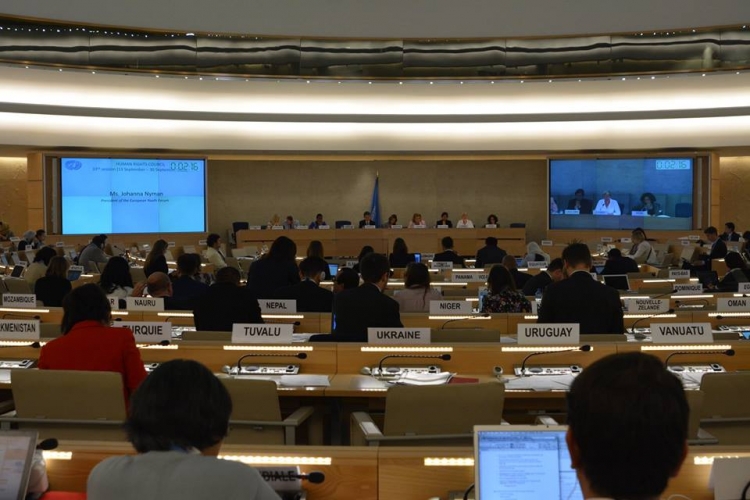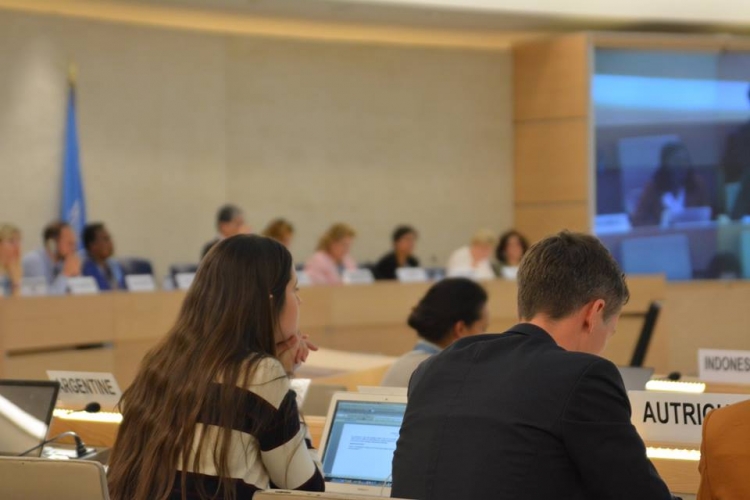22 September 2016- The Human Rights Council during its midday meeting held a panel discussion on youth and human rights in order to identify challenges, best practices and lessons learned in the exercise of human rights by young people, as well as relevant opportunities for the empowerment of youth in the exercise of their rights.
In her opening statement, Kate Gilmore, United Nations Deputy High Commissioner for Human Rights, noted that today’s demographic realities and the pace of global change combined to make of young people the most important generation of our time. There were 1.8 billion young people worldwide, the most the world had ever seen, which meant that there was no sustainable development without them and no sustained development if not for them.
Speaking in a video message, Ahmad Alhendawi, Envoy of the Secretary-General on Youth, emphasized that the adoption of the resolution on youth and human rights provided an opportunity to bring youth issues to the Human Rights Council in a systematic and meaningful way. Together the international community could widen the democratic space by strengthening youth participation and promoting their rights.
Anna Korka, Permanent Representative of Greece to the United Nations Office at Geneva and Panel Moderator, said that the objective of the panel discussion was to identify challenges and best practices in the exercise of human rights for young people. Today’s youth made up the largest young generation the world had ever known. Young people should not, and could not, be left behind.
Virginia Bras Gomes, Member of the Committee on Economic, Social and Cultural Rights, stressed that the International Covenant on Economic, Social and Cultural Rights had strong cross-cutting anti-discrimination provisions and contained explicit and implicit provisions for young people. The implicit Covenant provisions dealt with technical and vocational training, and social services to support families. The panel ought to identify challenges to the exercise of human rights by young people.
Johanna Nyman, President of the European Youth Forum, urged the Council to call for the preparation of a report that would map the obstacles that young people faced in accessing their rights, and to develop guidelines directing States in implementing a rights-based approach to youth policies. She also suggested the establishment of a Special Procedure on the human rights of young people.
Simon-Pierre Escudero, Representative of the Asociación de Tierra de Jóvenes from El Salvador, said that adolescents living and working in the streets in El Salvador could be taken advantage of by adults due to their ignorance and their inability to defend themselves. There was a lack of coordination among institutions in helping youth; efforts were often insufficient or duplicated. Access of young people to services needed to be facilitated and improved.
Maria D’Onofrio, Representative of VIDES International, stated that young people were frequently seen as the cause of tensions, even on the global scale. But the impulse to change the status quo was the truest meaning of being young. To ensure that youth rights issues remained on the agenda of the Human Rights Council, a report should be requested by the Office of the High Commissioner for Human Rights or the Human Rights Council Advisory Committee.
Yvonne Matuturu, Head of the Social and Human Sciences Section at the United Nations Educational, Scientific and Cultural Organization (UNESCO) Multisectoral Regional Office for Central Africa in Cameroon, said that in Africa young people made up to 50 per cent of the population. The challenges facing young people were multifarious and unemployment was a destabilizing factor. It was time to step up investment in policies and programmes so that young people could be positive innovators. There should be studies with disaggregated data on the challenges facing young people.
In the ensuing discussion, speakers noted that today’s generation of young people was the largest in history, and brought attention to the common challenges that affected youth worldwide, including the disproportionately high rates of youth unemployment, insufficient vocational education and on-the-job training, and the importance of the involvement of youth in the realization of the 2030 Sustainable Development Agenda. It was noted that, in many countries, youth were much more exposed to poverty than other groups.
Speaking were: Australia on behalf of a group of countries, Dominican Republic on behalf of the Community of Latin American and Caribbean Countries, Philippines on behalf of the Association of South Asian Nations, European Union, Canada on behalf of l’Organisation internationale de la Francophonie, Brazil on behalf of the Community of Portuguese Language Countries, Sudan on behalf of the Arab Group, Portugal, Georgia, Brazil, El Salvador, Bosnia and Herzegovina, Austria, Italy, Namibia, Greece, Bangladesh, United States, Israel, Organization of Islamic Cooperation, Council of Europe, Romania, Egypt, Republic of Korea, Pakistan, Libya, Indonesia, Spain, and Maldives.
Also taking the floor were the following civil society organizations: Australian Human Rights Commission, World Young Women’s Christian Association, CIVICUS – World Alliance for Citizen Participation, Commissioner for Human Rights in the Russian Federation, Action Canada for Population and Development, Save the Children International, and Rencontre Africaine pour la Defense des Droits de l’Homme.
The Council will next consider the outcomes of the Universal Periodic Review of Antigua and Barbuda, Swaziland, and Trinidad and Tobago.
Source: UN Human Rights Council


